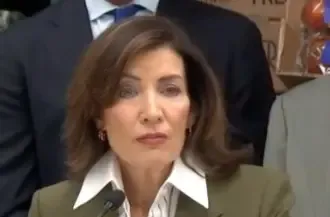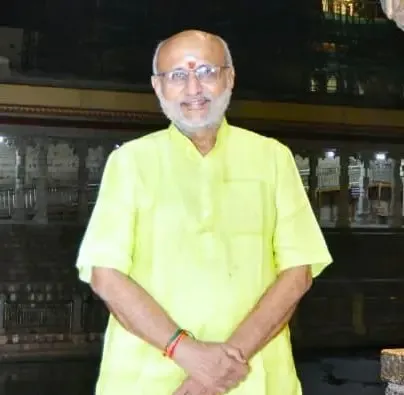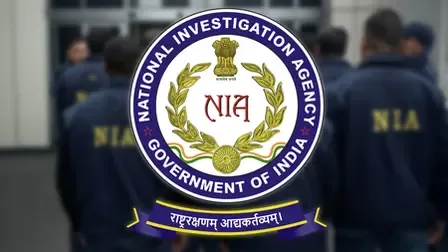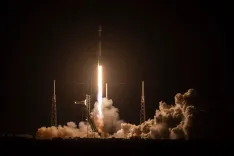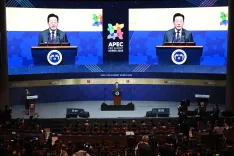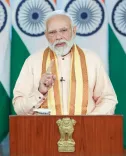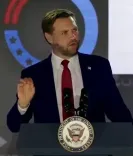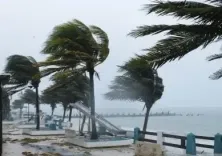Is The Third Eye Setting Trends in Trump's America?
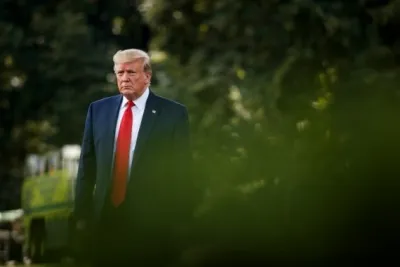
Synopsis
Key Takeaways
- Trump's governance emphasizes an America First approach.
- Executive Directives are used to address trade and immigration issues.
- India must navigate its relationship with the US carefully.
- Tariff policies aim to protect American workers and stimulate the economy.
- Global trading systems face potential fragmentation amid rising nationalism.
New Delhi, July 27 (NationPress) In the face of criticism directed at US President Donald Trump for utilizing Executive Directives as a key tool of governance within a democratic framework, numerous proclamations from the Trump administration appear to align with efforts to combat bureaucratic corruption, reduce unnecessary administrative burdens on the government, and address an alarming trade deficit contributing to a staggering $36 trillion debt on the American economy.
Trump's initiative of 'Making America Great Again' (MAGA), driven by the principle of America First, embodies his distinctive approach characterized by bold, personalized, and at times, hyperbolic statements. This has fostered a combative rhetoric against both domestic adversaries and international counterparts.
As domestic dissent against Trump escalates, former ally and entrepreneur Elon Musk, who was previously appointed to oversee the influential Department of Government Efficiency (DOGE), has become one of the President's fiercest critics.
Given that the US remains the world’s largest economy and a singular superpower, it is crucial for India to monitor its domestic, economic, and foreign policies while devising its own geopolitical and economic strategies.
Trump's declaration of a National Emergency first regarding Immigration in January and subsequently on Trade & Tariffs in April can be justified as responses to the nation’s significant challenges. The initial declaration enabled military deployment along the Southern border and mandated the Department of Homeland Security (DHS) to implement special teams across all states to proactively identify illegal migrants, while the latter aimed to establish reciprocity in trade to rejuvenate the economy and safeguard national security.
Furthermore, the Secretary of Defense was authorized to reallocate military construction funds to support border enforcement initiatives. Trump also highlighted a national emergency regarding foreign trade practices, intending to impose retaliatory tariffs to bolster the US's international economic standing and 'protect American workers'.
He emphasized the urgent need to address unfair trade practices, including currency manipulation and excessive Value Added Tax (VAT) imposed by other nations.
Trump introduced a 10 percent universal tariff on trading partners, alongside reciprocal tariffs based on each nation’s trade barriers. This tariff strategy reportedly yielded a US budget surplus of $27 billion in June 2025 alone. Trump has advocated for bilateral tariff negotiations, moving away from the previous unpredictability of his policies.
His tariff initiatives have emerged as a critical source of government income, with many US policymakers optimistic about reducing national debt and enhancing the efficiency of the private sector while preparing for equitable international trade.
Trump's administration aims to redistribute the financial responsibilities of providing essential global public goods, such as aid and defense, thus reshaping both the US and global economies.
Since World War II, the US economy and its financial system have been pivotal to global markets as the primary catalyst for world economic growth. The US has pioneered productivity-boosting innovations in areas like Artificial Intelligence, Life Sciences, and Robotics.
The dollar continues to serve as the world's reserve currency. Nonetheless, nations are striving to shield themselves from policy fluctuations in Washington, a reality Trump acknowledges. He observes Europe enhancing its regional influence and fostering stronger economic ties with Africa, Asia, and Latin America, while China is advancing its economic strategy to ascend as the second superpower. After nearly 80 years, the global trading framework faces fragmentation risk. Yet, the US remains the most influential and affluent nation, benefiting from robust institutions. For India, this moment presents an opportunity to cultivate self-reliance, promote 'Make in India' initiatives, and establish bilateral trade relationships with the US grounded in mutual advantages.
Trump has orchestrated the GOP's cancellation of $9 billion in approved congressional spending as part of his strategy to retract funding for foreign humanitarian programs and public broadcasting. Through the Rescissions Act of 2025, Trump aims to codify the recommendations from SAGE. Supporters argue this promotes responsible spending prioritizing US interests, while critics contend it jeopardizes US global leadership and disrupts essential international support programs.
In a bid to curtail government expenditures, Trump has directed the Department of Education (DOE) to resume interest accrual on 7 million student loans from August 1, 2025, without retrospective application. The DOE is also investigating certain universities for allegedly favoring 'illegal migrants' over US-born students under a specific scheme. This aligns with President Trump's America First agenda.
Meanwhile, the DHS has issued deportation notices to approximately half a million Cubans, Haitians, Nicaraguans, and Venezuelans who had been permitted to stay in the US for two years under the Biden Administration's 'humanitarian parole' program. President Trump is determined to dismantle the framework of illegal immigration to the US, and India has, in principle, expressed support for this initiative. He is striving to halt all spending on third-country projects, including 'humanitarian aid.'
President Trump has adopted a policy stance indicating a withdrawal from global organizations like UN agencies that impose financial burdens without benefitting American interests. Earlier this year, he announced a withdrawal from the WHO, which was subsequently followed by a joint statement from Secretary of State Marco Rubio and Health Secretary Robert F. Kennedy Jr. on July 18, opposing amendments proposed by the WHO in 2024 aimed at strengthening global health preparedness.
The statement criticized these amendments for compelling countries to adopt digital health documentation and prioritizing political issues like solidarity over prompt and effective action. It asserted that 'our agencies will continue to prioritize Americans in all actions and will not accept international policies that infringe on American speech, privacy, or personal liberties.'
The statement also emphasized that the amendments 'risk unwarranted interference with our national sovereign right to establish health policy.' Notably, Trump has accused the WHO of Chinese dominance, reflecting his desire to recalibrate geopolitical dynamics in favor of the US.
President Trump has now ordered the US withdrawal from UNESCO as well. As a significant global player, India has no objections to President Trump’s strategies and will navigate them with a focus on its national interests.
India should persist in expressing its substantial concerns to the US regarding the Sino-Pak axis, which primarily undermines its interests, and should not be deterred by the Pentagon's historical rapport with Pakistani generals.
Any challenges posed by Trump regarding Indo-Pak military tensions following the Pahalgam terror attack or issues related to trade and tariffs can be managed without jeopardizing the long-term friendship between India and the US.
India’s approach to Indo-US relations should be grounded in a mutual acknowledgment that both nations are the world’s largest tested democracies, and their partnership inherently possesses a natural aspect. Shared threats to global democracy, such as terrorism, authoritarianism, and international crimes like drug trafficking, bring them strategically closer.
All bilateral matters, including trade, tariffs, and US visa policies, can be navigated through negotiations, despite Trump’s pressure tactics aimed at asserting his agenda.
There remains ample opportunity for compromise between India and the US, even as both countries staunchly defend their national interests.
India should assert its sovereign right to procure defense equipment and energy from any trading partner and uphold its stance on international issues at competitive forums like BRICS and QUAD.
Politically and economically, the world has transitioned to a multi-polar order, notwithstanding US supremacy as a superpower. President Trump’s America First strategy presents a fresh opportunity for a major nation like India to redefine its international relations. A prudent approach for India involves fostering a robust domestic market for its growth, cultivating bilateral friendships to ensure mutual security and economic interests, and adopting a non-aligned perspective on global conflicts.
(The writer is a former Director of the Intelligence Bureau)

